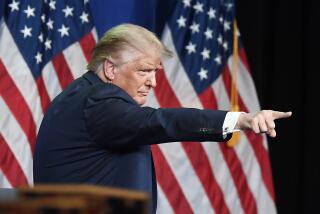Right Tone, Wrong Message for the GOP : Buchanan’s protectionist rhetoric strikes a chord, but it turns Reaganomics inside out.
For a party that prides itself on its businesslike commitment to economic growth, the Republicans certainly have had a hard time getting that message across. Whenever the GOP seems to be getting its economic act together, along comes someone like Pat Buchanan to muddy things up. After his victory in New Hampshire, the pugnacious pundit-turned-pol’s brand of retronomics will cause many over-taxed Americans to think that maybe the Democrats aren’t so bad after all.
Republican Herbert Hoover presided over the stock market crash of 1929; he turned a recession into a depression the following year when he signed not only a huge tax increase--the top income tax rate jumped from 30% to 65%--but also the Smoot-Hawley tariff, which shut off exports as well as imports. (Sen. Reed Smoot of Utah and Rep. Willis Hawley of Oregon, by the way, both were Republicans.) In 1969, Republican Richard Nixon signed “tax reform” legislation that dramatically increased capital gains taxes and helped provoke an economic slowdown. To be sure, Nixon was pushed by Democrats in Congress, but it was not liberals who made the 37th president raise tariffs, impose wage and price controls and take the U.S. off the gold standard, ushering in the stagflation of the ‘70s.
Not until Ronald Reagan came along in 1980 did the GOP recapture the idea of growth and opportunity. Reagan’s genius was his ability to translate the complicated ideas of economists such as Milton Friedman and Arthur Laffer into memorable formulations that resonated in people’s hearts as well as heads; every speech cited either the Bible or the Founding Fathers. Reagan’s 1981 inaugural set the pro-market don’t-tread-on-me tone: “Government is not the solution to our problems; government is the problem.” To be sure, the Gipper’s rhetoric was better than reality, but the Reaganized Republicans dominated the economic debate for a decade.
Then the GOP grew lazy: It assumed that the natural state of affairs was that a Great Communicator would always be there to heavy-lift on behalf of free markets. By this smug reckoning, George Bush’s tax-and-spend presidency was but a detour from the true path; he was punished at the polls in 1992. Then, after two years of Clintonomics, came 1994. Surely with such neo-Reaganites as Newt Gingrich and Dick Armey in charge, the free market faith once again was safe.
The Republicans of the 104th Congress, however, failed to see that the nature of the challenge had changed. Free markets assured growth, but the wealth trickled down unequally; public sector institutions like schools that were supposed to ameliorate inequality were in a state of collapse. With much of the middle class downwardly mobilizing, the gross national product rose and yet national morale fell.
Enter Buchanan. He saw an opening for a politics of outrage: “These people know me,” he said on Tuesday. “They know I stand for them, I reflect their anxieties and their concerns.” Long before he worked as communications czar in the Reagan White House, Buchanan knew what Reagan knew: that to be effective, an economic message must be couched in the culture. While Bob Dole and his fellow Washingtonians were wrangling over budgetary abstractions, Buchanan was readying his insurgency on behalf of the “forgotten Americans” who have been “betrayed” by the political and corporate elites.
Confronted by Buchanan’s “conservatism of the heart,” Republicans must use their heads. Lawrence B. Lindsey, a Republican governor of the Federal Reserve Board, explains the economic follies of protectionism: “The U.S., as the leading technological exporter in the world, has the most to lose from a trade war.” Since even the shadow of tariffs causes capital to flow elsewhere, Buchanan’s victory already may have done damage. Lindsey notes that the historical growth rate of the U.S. economy has been 2.5% a year. Knocking even 1/10th of a point off that rate would, over a decade, reduce the income of a family of four by $1,000 a year.
Buchanan has no coherent intellectual response; he relies on passion to overcome the dismal science of professors. If his protectionist pitch could work in New Hampshire, where the per capita income is nearly 20% higher than the national average and the unemployment rate more than two points lower, then Buchanan’s brigades could well triumph in the more populist South and West. Partisan Democrats may cheer as Buchanan de-Reaganizes the GOP, but all Americans should realize that they have much to lose if this New Communicator succeeds in re-Hooverizing the country.
More to Read
Get the L.A. Times Politics newsletter
Deeply reported insights into legislation, politics and policy from Sacramento, Washington and beyond. In your inbox three times per week.
You may occasionally receive promotional content from the Los Angeles Times.










